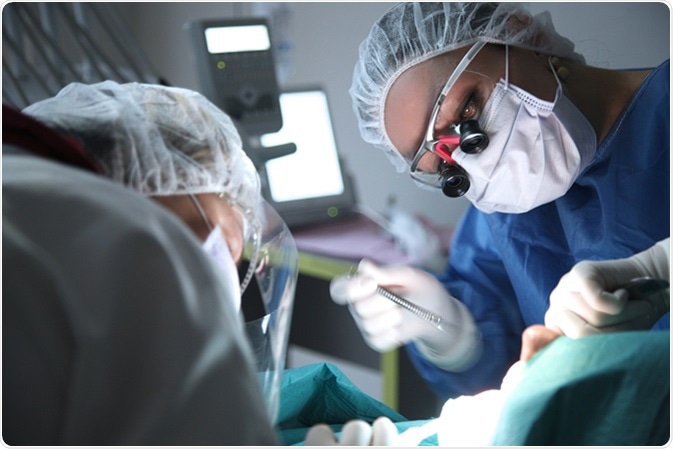The recovery period after a dental crown procedure typically lasts for a few days, as the body recovers from the irritation and inflammation associated with the procedure. It is normal for patients to experience some sensitivity, discomfort or pain initially, which should subside after the first few days.

Image Credit: Anna Jurkovska / Shutterstock
Numbness from Anesthetic
If a local anesthetic was used during the dental crown procedure, the numbing effect may still be present for several hours after the dental appointment.
During this time, patients are prone to burn or bite themselves unknowingly because they are unable to feel the warning sensations, such as heat or pain, as usual. For this reason, it is recommended to avoid drinking hot liquids or chewing hard foods during this time.
There may also be some bruising and inflammation at the site of the anesthetic injection shortly after the dental crown procedure, particularly on the lower jaw. This should go away spontaneously without the need for treatment after several days.
Pain, Discomfort and Sensitivity
Most people experience some pain or discomfort in the affected area of the mouth following a dental crown procedure. This typically improves after several days or weeks without any assigned treatment.
Many patients find it useful to use simple analgesic medications to help manage the pain in the meantime. For example, ibuprofen is often recommended to help reduce the associated pain and make the patient feel more comfortable.
Some sensitivity of the surrounding gums is common following the placement of a dental crown, due to irritation from the dental cement. In most cases, a topical anesthetic gel readily available at most pharmacies is able to help relieve this, and is often more effective than oral medications such as ibuprofen. A toothpaste for sensitive teeth may also be useful.
If the pain continues beyond several weeks or it is severe, it may be necessary for patients to seek dental advice to investigate the situation.
While it is normal for the crown to feel strange as patients get used to the feel of it in their mouth, in some cases the crown may need some adjustment to properly fit the shape of the mouth. If the bite does not seem right after several days or a week, dental advice to investigate the need for adjustment should be sought.
Care for Temporary Crowns
Most people who need a dental crown will get a temporary crown to protect the prepared abutment tooth between the two appointments, while the permanent crown is being constructed to fit their jaw and bite shape. The temporary crown will require special care to prevent fractures and dislodgement because it is more fragile than the permanent crown.
In general, patients can continue to eat and brush their teeth as normal; however, the following diet and oral care recommendations are prudent:
- Avoid sticky or chewy foods, which may dislodge the temporary crown
- Avoid hard foods, which may break the temporary crown
- Attempt to chew most foods on the opposite side of the mouth while the temporary crown is in place
- Avoid flossing next to the temporary crown, or take care to slide the floss rather than lifting it out
Dietary and Oral Care Advice During Recovery
When the permanent dental crown has been placed and the numbing effect of the anesthetic has worn off, patients should be able to eat any foods as normal. However, it is best to avoid sticky foods in the first 24 hours following the procedure to cement the crown to the abutment tooth.
It is common for patients to be hesitant to eat hard, sticky or chewy foods initially, but they can gradually introduce these types of food as their confidence in the permanent dental crown increases.
Exemplary oral care should continue to be practiced for the lifetime of the patient. They should be aware that crowns are still susceptible to decay, particularly along the gum line of the abutment tooth. For this reason, it is important for patients to brush their teeth with fluoride toothpaste twice a day and carefully floss daily.
References
Further Reading
Last Updated: Dec 29, 2022